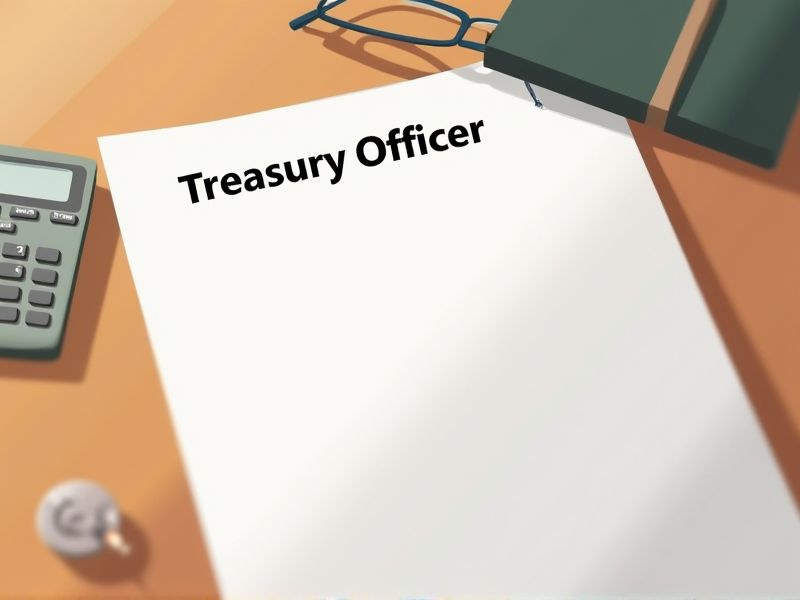
Treasury officers play a critical role in managing an organization's cash flow, investments, and financial risk, necessitating a deep understanding of complex financial instruments and practices. Certifications help ensure proficiency in these critical areas by equipping officers with validated expertise and up-to-date industry standards. These credentials also enhance an officer's credibility and competitiveness in the financial sector. Some key certifications that could be essential for a Treasury Officer include the following.
Certified Treasury Professional (CTP)
Obtaining the Certified Treasury Professional (CTP) designation provides Treasury Officers with a validated mastery of the core concepts required in the field. Employers often prefer or require CTP certification as it demonstrates competency and a commitment to professional development. Treasury Officers with the CTP credential are typically more adept at managing organizational liquidity, risk, and capital, which are critical aspects of the profession. The certification is recognized globally, offering a competitive edge in the job market and expanding career advancement opportunities.
Chartered Financial Analyst (CFA)
A Chartered Financial Analyst (CFA) designation provides a deep understanding of financial analysis, which is essential for effective treasury management. The CFA program's emphasis on credit analysis and risk management aligns with a treasury officer's responsibilities in managing a firm's liquidity and financing strategies. A treasury officer benefits from the CFA's extensive focus on asset valuation by making more informed decisions about corporate investments and debt instruments. Financial reporting and quantitative methods covered in the CFA curriculum enhance a treasury officer's ability to forecast cash flows accurately and manage foreign exchange exposures.
Certified Public Accountant (CPA)
A Certified Public Accountant (CPA) brings a rigorous understanding of financial regulations, enabling Treasury Officers to ensure compliance with laws and policies. Their expertise in financial analysis equips Treasury Officers to make informed decisions on asset management and risk assessment. CPAs have a deep knowledge of tax implications, which aids Treasury Officers in planning to minimize financial liabilities. The credibility and trust that a CPA designation holds can enhance the reputation and accuracy of the treasury department's financial reporting.
Certified Management Accountant (CMA)
A Certified Management Accountant (CMA) is needed for a Treasury Officer to enhance strategic financial decision-making skills. The CMA credential equips professionals with a robust understanding of financial management and risk analysis, critical for treasury operations. Employers value the CMA certification as it demonstrates proficiency in budgeting, which directly aligns with the treasury's role of managing an organization's liquidity. CMAs bring analytical skills essential for optimizing investment strategies and ensuring compliance with financial regulations, crucial responsibilities for a Treasury Officer.
Financial Risk Manager (FRM)
A Financial Risk Manager (FRM) identifies and assesses potential financial risks, enabling the Treasury Officer to better manage cash flow and maintain liquidity. The presence of an FRM helps ensure compliance with regulatory requirements, reducing the risk of legal penalties. By analyzing market trends, the FRM provides data-driven insights that inform more effective investment strategies for the Treasury. Collaboration between the FRM and Treasury Officer enhances decision-making, leading to optimized risk-adjusted returns for the organization.
Certified Corporate Financial Planning & Analysis Professional (FP&A)
A Certified Corporate Financial Planning & Analysis Professional provides structured financial insights, enabling a Treasury Officer to make informed investment decisions. Their skills in forecasting and budgeting enhance cash flow management, reducing risk exposure for the organization. Expertise in financial modeling aids the Treasury Officer in strategic risk assessments and capital allocation. Certification also ensures adherence to best practices and regulatory compliance, mitigating potential financial missteps.
Professional Risk Manager (PRM)
The role of a Professional Risk Manager (PRM) is crucial for a Treasury Officer because managing financial risk effectively is central to safeguarding an organization's assets. A PRM provides expertise in identifying, assessing, and mitigating risks such as interest rate changes and foreign exchange fluctuations, which are critical for treasury decisions. Treasury Officers rely on PRMs to ensure compliance with financial regulations and to maintain the organization's financial health. The strategic input from a PRM enables the organization to optimize cash flow and investment strategies by forecasting potential market impacts.
Certified Internal Auditor (CIA)
The Certified Internal Auditor (CIA) designation equips a treasury officer with an enhanced understanding of internal controls, which is crucial for managing organizational assets effectively. Acquiring the CIA can lead to improved risk management strategies, allowing treasury officers to mitigate potential financial risks. Being a CIA holder signals commitment to ethical standards, which is vital in instilling trust and safeguarding company resources. The certification provides treasury officers with a global perspective on industry best practices, crucial for multinational operations.
Certified Cash Manager (CCM)
A Certified Cash Manager (CCM) enhances a Treasury Officer's skills with a rigorous understanding of cash flow optimization and working capital management. This certification ensures the Treasury Officer is well-versed in advanced financial risk management strategies, resulting in more effective mitigation of potential risks. CCM accreditation signifies a higher level of competence and credibility, which can lead to improved trust and cooperation from stakeholders. Employers often prioritize candidates with CCM credentials, as it indicates a commitment to continual learning and expertise in financial stewardship.
Certified Fraud Examiner (CFE)
Fraudulent activities present significant risks to a treasury department's integrity and financial stability, necessitating a Certified Fraud Examiner's expertise to identify and mitigate these threats. Their specialized training in fraud prevention and detection equips treasury officers with the capability to implement effective internal controls. Treasury officers benefit from CFEs' skill set to ensure compliance with financial regulations and safeguarding assets. Incorporating a CFE helps bolster stakeholder confidence by fostering a culture of transparency and accountability within the treasury operations.
Summary
With certifications, you gain enhanced credibility, instilling greater trust from colleagues and stakeholders. The specialized knowledge acquired can lead to increased efficiency and effectiveness in managing financial resources. Holding certifications often opens pathways to career advancement and higher compensation. Consequently, your skills could lead to better decision-making, ultimately benefiting organizational fiscal health.
